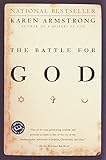Karen Armstrong The Battle for God*1から。
曰く、
The Palestinians had not been caught up in the religious renewal that had seized the Muslim world after 1967. Their response to the Arab defeat was political, secularist, and nationalist. (…) But after the PLO nationalists were suppressed in the Gaza Strip by Ariel Sharon in 1971, Sheikh Ahmed Yasin founded an Islamic movement which he called Mujamah(“Congress”), which initiated the type of welfare program that was associated with the Muslim Brotherhood. By 1987, Mujamah had established a charitable empire in the Strip, consisting of clinics, drug-rehabilitation programs, youth clubs, sporting facilities, and Koran classes, supported by zakat(the Islamic tax), by the oil-rich Gulf states, and by Israel, which hoped to undermine the PLO by supporting Mujamah. For Yasin at this point was not interested in armed struggle against Israel. He was a reformer, who wanted to bring the fruits of modernity to the refugees of Gaza in an Islamic setting. He was also contending for the soul of Palestine against the nationalists: the cultural identity of the Palestinian people, he believed, should be Muslim rather than secular. The popularity of Mujamah showed that many Palestinians agreed. They were proud of Arafat, but his secularist ethos only made perfect sense to an elite who had the benefit of a modern Western education. (pp.350-351)
But in the early days of the intifadah, a new organization formed which gave the Palestinian struggle a disturbingly nihilistic Islamic dimension. The leadership of intifadah was secularist, but some members of Mujamah founded HAMAS(Haqamat al-Muqawamah al-Islamiyyah: Islamic Resistance Movement), which fought both the Israeli occupation and the Palestine nationalist movement. They were fighting the secularists for the Muslim soul of Palestine, and young men joined HAMAS in droves. Many came from the refugee camps, but others were middle-class and white-collar workers. It was a violent movement that, yet again, was born of oppression. HAMAS terrorism escalated after the killing of seventeen Palestinian worshippers on the Haram al-Sharif on October 8, 1990. Impelled by a fear of annihilation, HAMAS also attacked Palestinians whom they judged to be collaborators with Israel. (…) Like Islamic Jihad, HAMAS saw the Arab-Israeli conflict in religious terms. The Palestinian tragedy had, members believed, come about because the people neglected their religion; Palestinians would only shake off Israeli rule when they returned to Islam. HAMAS believed that the success of Israel was due to Jewish faith, and that Israel was dedicated to the destruction of Islam. (…) (p.352)

The Battle for God: A History of Fundamentalism (Ballantine Reader's Circle)
- 作者: Karen Armstrong
- 出版社/メーカー: Ballantine Books
- 発売日: 2001/01/30
- メディア: ペーパーバック
- クリック: 43回
- この商品を含むブログ (28件) を見る